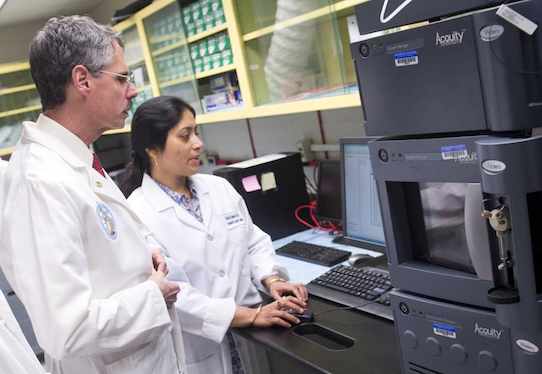 Researchers have discovered and validated a blood test that can predict with greater than 90 percent accuracy if a healthy person will develop mild cognitive impairment or Alzheimer’s disease within three years.
Researchers have discovered and validated a blood test that can predict with greater than 90 percent accuracy if a healthy person will develop mild cognitive impairment or Alzheimer’s disease within three years.
Described in the April issue of Nature Medicine, the study heralds the potential for developing treatment strategies for Alzheimer’s at an earlier stage, when therapy would be more effective at slowing or preventing onset of symptoms. It is the first known published report of blood-based biomarkers for preclinical Alzheimer’s.
The test identifies 10 lipids, or fats, in the blood that predict disease onset. It could be ready for use in clinical studies in as few as two years and, researchers say, other diagnostic uses are possible.
There is no cure or effective treatment for Alzheimer’s. Worldwide, about 35.6 million individuals have the disease.
Federoff explains there have been many efforts to develop drugs to slow or reverse the progression of Alzheimer’s disease, but all of them have failed. He says one reason may be the drugs were evaluated too late in the disease process.
“The preclinical state of the disease offers a window of opportunity for timely disease-modifying intervention,” Federoff says. “Biomarkers such as ours that define this asymptomatic period are critical for successful development and application of these therapeutics.”
 The study included 525 healthy participants aged 70 and older who gave blood samples upon enrolling and at various points in the study.
The study included 525 healthy participants aged 70 and older who gave blood samples upon enrolling and at various points in the study.
In the study’s third year, the researchers discovered that a specific blood test was able to distinguish with 90 percent accuracy which cognitively normal participants would digress within two to three years to Alzheimer’s disease or a condition of mild cognitive impairment, in which memory loss is prominent.
“We consider our results a major step toward the commercialization of a preclinical disease biomarker test that could be useful for large-scale screening to identify at-risk individuals,” Federoff says. “We’re designing a clinical trial where we’ll use this panel to identify people at high risk for Alzheimer’s to test a therapeutic agent that might delay or prevent the emergence of the disease.
(More details from Georgetown Univ)



















